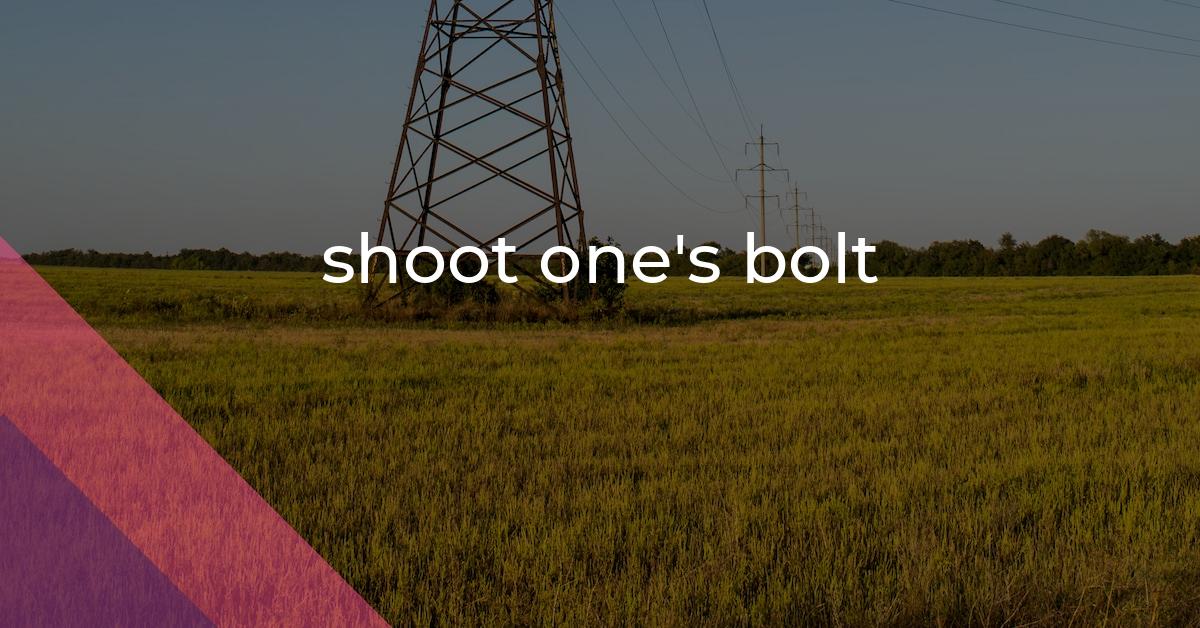shoot one’s bolt: Idiom Meaning and Origin
What does ‘shoot one's bolt’ mean?
The idiom "shoot one's bolt" means to use up all of one's energy, resources, or ideas, often resulting in a decline in effectiveness or performance.

Idiom Explorer
The idiom "shots fired" is used to signal a strong or provocative statement or action that is meant to challenge or criticize someone or something.
The idiom "shoot the boots" refers to someone engaging in excessive and reckless drinking. It emphasizes the act of consuming alcohol in large quantities, suggesting a lack of moderation or control.
The idiom "shoot oneself in the foot" means to do something that harms oneself or sabotages one's own efforts unintentionally or out of foolishness.
The idiom "shoot down" means to reject or dismiss an idea, proposal, or suggestion, often in a harsh or abrupt manner.
The idiom "last burst of fire" refers to the final display of energy or effort before a decline or end. It signifies a final attempt to accomplish something or make an impact before fading away.
The idiom "knock oneself out" means to exert a lot of effort or work extremely hard. It is often used to encourage someone to do something with great enthusiasm or without holding back.
The idiom "guns blazing" means to engage in a task or activity with great determination, energy, and enthusiasm.
FAIL
Shoot one's bolt is an idiom that has a long history in the English language. It is believed to have originated from archery or firearms. The idiom is used to describe the act of expending all of one's energy or resources in a single effort or attempt.
One interpretation of this idiom is that it refers to the action of shooting a bolt from a crossbow. In archery, a bolt is a type of projectile that is similar to an arrow, but shorter and heavier. When a crossbow is shot, the bolt is released with a sudden burst of energy. This concept of expending all of one's energy or resources in a single effort or attempt is reflected in the figurative use of the idiom.
Another explanation is that the idiom may have evolved from the concept of firearms. In early firearms, a bolt was a type of metal rod that held the gunpowder and ammunition in place. When the gun was fired, the bolt was released, causing the gunpowder to ignite and propel the projectile forward. This action required a sudden burst of energy, similar to shooting a bolt from a crossbow. Over time, this concept may have been metaphorically applied to situations where a person expends all of their energy or resources.
The idiom is often used in contexts where someone has given their all or made their best effort, but ultimately falls short of achieving their desired outcome. It can also be used to describe a situation where someone has exhausted their resources or options and can no longer continue. The use of the idiom implies a sense of finality or completion, as if all possibilities have been explored and there is nothing more that can be done.
Shoot one's bolt is related to several other idioms with similar meanings. One such idiom is "shoot one's load." This idiom is often used to describe someone who has exhausted all of their energy, efforts, or resources. It carries a similar connotation of giving one's all and reaching a point of completion or exhaustion.
Another related idiom is "bust one's balls." This idiom is often used colloquially to mean working extremely hard or pushing oneself to the limit. It shares the theme of expending a great deal of effort.
The expression "shoot oneself in the foot" is another idiom related to "shoot one's bolt." It is used to describe someone who unintentionally undermines their own efforts or causes their own failure. Both idioms involve the concept of self-sabotage and the consequence of an unsuccessful outcome.
"bolt to the bran" is another idiom related to "shoot one's bolt." It means to escape or leave a situation suddenly and with great speed. While it does not share the same meaning of expending all of one's resources, it does share a sense of intense and immediate action.
The idiom "burn one's bridges" is also related to "shoot one's bolt." It refers to the act of creating a situation where there is no possibility of return or reconciliation. Both idioms carry the idea of finality and reaching a point of no going back.
Shoot one's bolt is an idiom that has its origins in archery or firearms. It is used to describe the act of expending all of one's energy or resources in a single effort or attempt. The figurative use of the idiom reflects a sense of finality or completion, as if all possibilities have been exhausted. While the exact origins of the idiom may be uncertain, its meaning and usage have endured throughout history. As language continues to evolve, it is interesting to consider how idioms such as shoot one's bolt may continue to shape our understanding and expression of the world.
Example usage
Examples of how the idiom "shoot one's bolt" can be used in a sentence:
- He shot his bolt in the first half of the game and wasn't able to contribute much afterward.
- After weeks of intense preparation, the presenter really shot his bolt with an impressive and well-received final presentation.
- She was nervous about the interview and ended up shooting her bolt by giving away too much information too early.
Analysis:
The idiom "shoot one's bolt" carries the meaning of expending all of one's energy, effort, or resources too soon, often resulting in a lack of effectiveness or the inability to sustain a certain level of performance. It's derived from the action of shooting an arrow using a bow, where once the bolt (arrow) is shot, it cannot be retrieved.
In the first example, it is implied that the person exerted all their effort and energy in the first half of the game, leaving them unable to contribute much afterward. This showcases the idea of exhausting one's resources too soon.
The second example illustrates how the presenter put forth an impressive and well-received final presentation, indicating that they had used up their most impactful ideas or content. This showcases the idea of expending all resources or efforts in one notable instance.
In the third example, the individual's nervousness caused them to divulge too much information too early in the interview. This signifies shooting their bolt by revealing their key points prematurely and possibly diminishing the impact of their later statements.
More "expression" idioms



